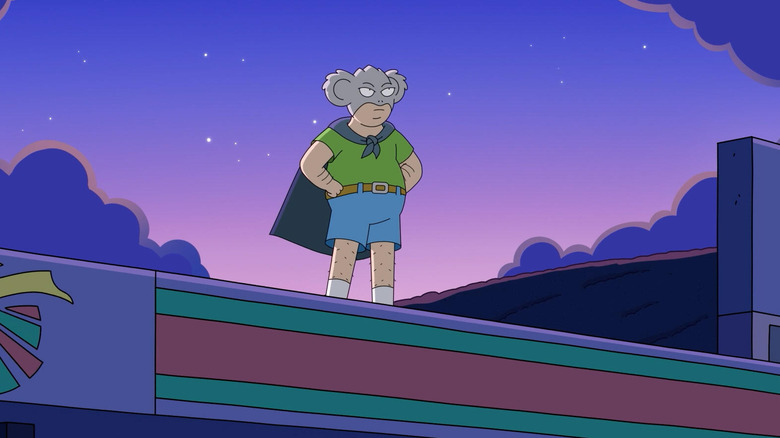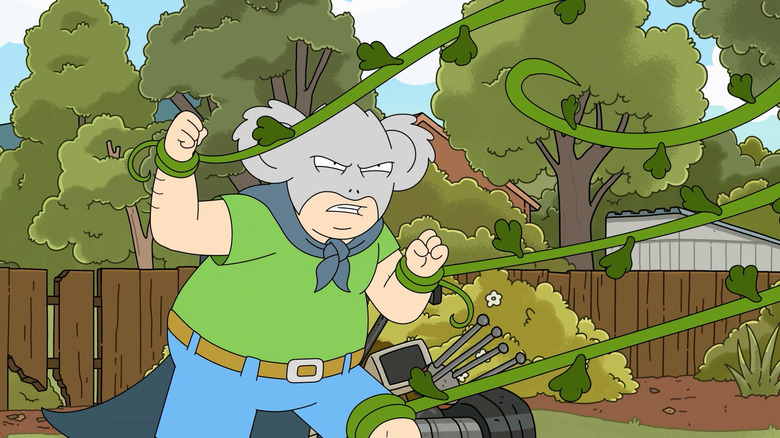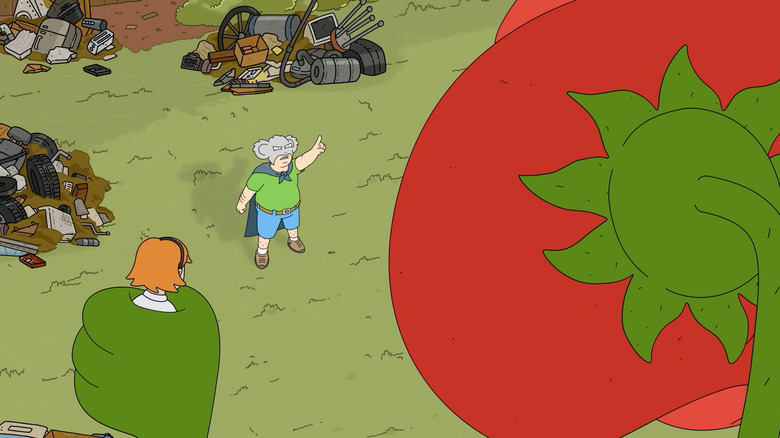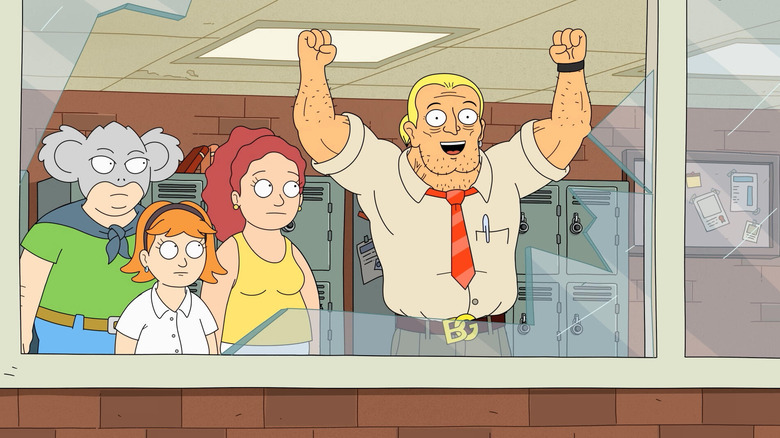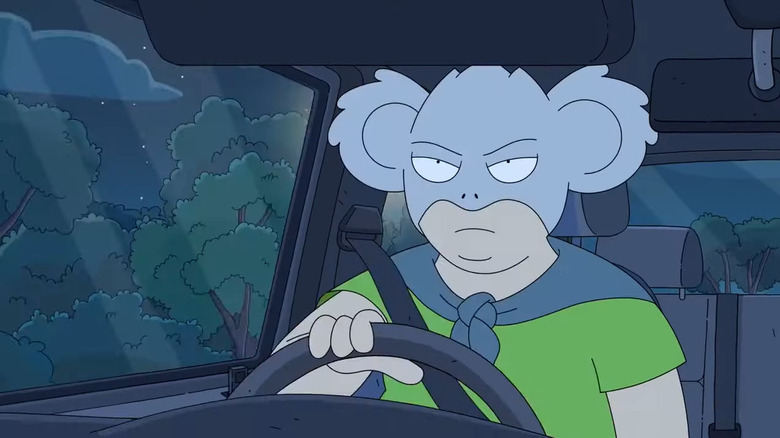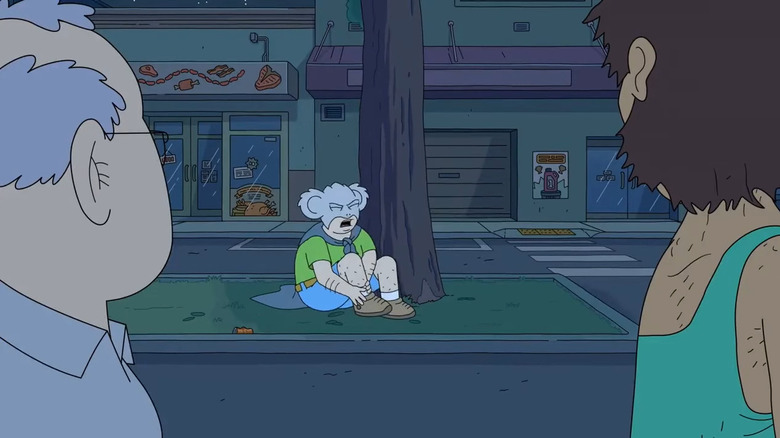Koala Man Showrunners On Injecting Specificity Into Their Animated Suburban Superhero Story [Exclusive Interview]
The animated sitcom is a long and proud tradition in American TV history. Ever since Hanna-Barbera premiered "The Flintstones" in 1960, we've seen hundreds of shows exploring endless possibilities of the animation medium and mixing them with the tropes of family sitcoms.
Now comes a new show, one starring a hero who aspires to join the pantheon of animated sitcom characters like Fred Flintstone, Homer Simpson, Eric Cartman, or Peter Griffin. He is an ordinary family man during the day, but at night he dons his cape and cowl and defends the people of suburban Australia as its silent guardian, its watchful protector, its dark knight. He is Kevin, but he also is "Koala Man."
Michael Cusack created and stars in the show, which is executive produced by Justin Roiland of "Rick and Morty" fame, and "Detective Pikachu" writers Dan Hernandez and Benji Samit. "Koala Man" is hilarious, playing as a parody of the seriousness of superhero tropes and archetypes within the mundane suburban life of a sitcom protagonist. Plus, it's got a great cast that includes Hugh Jackman, Hugo Weaving, Miranda Otto, and more.
Ahead of the show's premiere on Hulu, /Film got to chat with showrunners Dan Hernandez and Benji Samit about making a superhero sitcom, surrealist Australia, and more.
Real human being, and a real hero
Can you walk me through the process of getting the show made?
Samit: It was a multi-year ordeal, and we weren't even there at the very genesis of it. Michael Cusack, who created the character and plays Koala Man, he's amazing, brilliant animator, performer, Jack of all trades. And he created this character as a series of shorts in Australia, and that eventually caught the eye of 20th Century Animation. Meanwhile, we had been talking to them and doing some work with them on some other shows, "Central Park" for Apple. And they were like, "What do you think of this character, Koala Man?" And we loved it, and we sat down with Michael, and it was just instant chemistry. The three of us just had a vision for what this show could be. Then it was the long process of developing it, shaping it, writing a pilot, convincing Hulu and everyone else to join in on our insane vision. But yeah, it was sort of an arranged marriage that worked out as well as one could ever hope.
This show is still a comedy, but it does have superhero elements. Can you talk about the balance of tone there?
Hernandez: I think that was something that as we as a group, with Michael and the rest of the amazing writing staff, sat down and really started to think about what made us excited about the show, it became clearer and clearer that we had a real genuine desire to tell an amazing superhero story within the parameters of this guy who's concerned about how long the grass is and what day the bins go out for garbage day.
It was a real tonal challenge to say, "Can we take this guy who doesn't have powers, whose only superpower seems to be that he cares more about the rules than anyone else, and thrust him up against monsters and aliens and things that are completely supernatural or out of this world?" And his attitude toward them is sort of the same as if he were trimming the grass, that it's all just a problem to be dealt with.
As the season evolves, he evolves as a character, as a hero. He's not amazing at being a superhero, but he is persistent, and he is brave. So it became a really fun challenge to think of, "What is the craziest possible thing that we could put Kevin/Koala Man up against and somehow still have him come out on top?" And that's really what the first season is about, is really getting into the heart of this guy and what makes him tick and how he reacts to these insane scenarios as they pop up.
Authenticity and specificity
I really like how specific it is in not just the superhero comedy of it all, but the Australian jokes and the slang and everything. I'm curious how it was for you guys to come into the show and work with Michael and have that aspect of the show in there.
Hernandez: It was a real learning curve for us as Americans. We sometimes say that the show is set in "Australia" in quotation marks, because it's a surrealist Australia that's told through Michael's point of view and through his art. So what we learned in the writers' room is that there was nothing that our Australian writers could say to us that we wouldn't sort of halfway believe. Like, "Oh, we rode to school every day on a kangaroo, and that's just how we got to school." You kind of don't believe them, but for a second you go, "Is that true? Could that be true?" And we realized that a lot of things about Australian culture were sort of similar to American culture, but just different enough that it seemed odd.
What ended up happening is it allowed us to tell stories that, in adult animation, hadn't been told a million times before. Because there are all these amazing shows like "The Simpsons," like "Family Guy," "South Park," all of these classic legacy shows that we all grew up watching and appreciating, but sometimes when you're in a writers' room, it really is that thing of "'Simpsons' did it, 'Simpsons' did it." And with this show, because we were coming from an American point of view to learn about all this Australian stuff, it allowed us to tell stories that we hadn't seen before.
Samit: Any time one of the Australian writers shared a unique thing about Australia, we could be like, "Oh, that's an episode." Whereas if an American shares something, oftentimes it's, "Oh wait, did 'The Simpsons' do something like that? Oh, 'Family Guy' did that. Oh, 'South Park' already did that." But with all the unique Australian things, no show has ever done it before. So we really quickly were able to piece together an entire season of these unique, specific things.
Then there's this added thing of something that we experienced when we were writing and producing on "One Day at a Time" is cultural specifics, even though they're different from culture to culture, just having specifics is a universal thing that brings people in, where it's just like, "Oh, it feels real. It feels like a real family. It feels like this is a real place." Because even though they do things differently, I do things differently too. Not everyone's the same. And I think a lot of the time in shows or movies or things, sometimes you get a watered down thing that is just meant to appeal to everyone, but actually, people like seeing specifics and little nuances, even if it's not what they relate to, because it feels real.
Getting Hugh Jackman
I do have to ask about the cast, and of course there's the Hugh Jackman of it all, but there's also Hugo Weaving, Miranda Otto ... can you talk a bit about finding the cast for the show?
Hernandez: I mean, we were extremely fortunate that Hugh, pretty much from the beginning, just got the show and was extremely into it. I think he was very enthusiastic about having a show set in Australia that would allow him to be himself. And Dapto is a real place in Australia, and I think that it's a place a lot of Australians are familiar with. It's a suburb of Sydney, but it's near the town of Wollongong, so it's a place that a lot of Australians are familiar with, and I think it tickled him that there was a show set in this random, real Australian town. In some ways, he was the easiest person to get on board because he just got the show immediately. And once we had Hugh, it was really ... and our casting agent, Telford Casting in Australia, they know everyone in Australia.
So you start to realize that it is a small acting community. That really was to our advantage, because we would make a dream list of, "Well, it'd be amazing to get Miranda Otto, but she'll never do it." And they'd go, "Why not? Why wouldn't she do it?" And all of a sudden, she's on the show. Or, "Well, I mean, in a dream world, we'd have Hugo Weaving do this, but he would never do that." And they'd go, "Of course he would. We know Hugo." So we were really fortunate to get some of the absolute top talent in Australia to do this craziness. And I think what we also discovered is that a lot of these amazingly successful dramatic actors don't always have an opportunity to do comedy.
Nobody had a better time than Hugo Weaving during the recording of this. He was absolutely incredible. You see why he's a super international star because he is such an incredible actor, and you almost feel in the moment like, "Oh, we don't deserve this. We don't deserve someone as good as you doing these crazy 'Koala Man' lines." But they gave full commitment. And Hugh Jackman really led the charge on that. I mean, Sarah Snook, obviously, hugely successful, amazing on "Succession," just an incredible performer. And then we also found people like Demi Lardner, who maybe isn't as famous as some of the other people in the cast, but is such an amazing comedian in Australia and was just perfect for the part.
So we've also been able to get ahead of some newer Australian talent that we think are going to be superstars in the future, or on their way to being superstars. So we've tried to populate the ensemble of Koala Man with a mixture of really incredible, almost like Shakespearean actors and up and coming sort of alt comedians. It's really been a nice mixture, and we've really been very fortunate to get the cast that we were able to assemble. It's kind of an Australian all-star team.
A little Sam Raimi inspiration
There's a joke about Chris Hemsworth and how they send Australian actors to the U.S. So having named Chris Hemsworth as a real person in the show, does that rule him out of being cast? Does that shut that door to you guys, or do you keep that open to get some weird meta thing in there somehow?
Samit: If Chris Hemsworth wants to do the show, we are more than happy to welcome him with open arms. Yeah, we would figure out a way to make it work. [laughs]
Hernandez: And I think that we did make a decision that the world does have some of the touchstones of our world, like real actors, Alexandra Daddario is in that first episode, as you know. She was amazing. Again, a similar situation where we thought, "Well, there's no way that she'll do this." And then she was like, "Yeah, I'd love to." So we were so fortunate. It just makes that joke so much funnier at the end to really have her in that beat.
So I think that we have sort of committed to the world of Koala Man is kind of like our world, except when it's not. And as the series goes along, and as you'll see more episodes, you'll see that there are some really major divergent points along the history of this world. And it gets fairly crazy and complex, but in a really fun way. But it also doesn't preclude us from having people like Chris Hemsworth either as himself or as another character that he might play. That's another fun thing, that we have a lot of options when we're telling these stories and figuring out how to cast them.
I'm curious about having Kevin talk to his Koala Mask, sort of like the Sam Raimi "Spider-Man" movies.
Hernandez: That was exactly the scene that we were thinking of when we wrote that scene. That Green Goblin scene with Willem Dafoe in the first "Spider-Man" movie. And we felt like we always wanted to be funny, but we also wanted the show to have an emotional reality to what it really would be like if your dad had a midlife crisis and turned into this superhero and what would provoke him to do that. We explore the roots of why he becomes Koala Man later in the season, and it's sort of a tragic backstory as it turns out — not heavy, like, depressing, but he's been through some real s***.
And we felt like letting him talk to his own persona, and maybe even a harsher and more black and white version of his persona, felt like a good way to start to explore what he's thinking about and why he cares about all these things and how he perceives himself and how he perceives this superhero persona. And his relationship with the mask actually evolves over the course of the first season. I don't want to spoil it, but he has a separate arc just with his own internal monologue that is really, I think, satisfying. But it starts where you really see the mask is very black and white, even more so than Kevin himself, and that continues to be sort of his sounding board, for better or worse, for the first season, and then things become even more complicated as it goes along.
Pressure of expectations
Having developed this show from the ground up, how does the pressure of that, of having something nobody has seen before, compare to working on something like "Detective Pikachu" that is highly anticipated and scrutinized?
Samit: I think it's been somewhat refreshing to just be able to create this entire world in a vacuum and build out our own universe and mythology and this and that. Not to say that we don't enjoy doing all the stuff we do with various franchises and existing IPs, and that's obviously a different type of fun for us. That's sort of a modern version of playing with our action figures. These are characters that we love and we can just play with them and have fun and create a great story.
But this one scratches a different itch of really building something. And yeah, it's really nice, but it also has the added thing of like, "Well, we have no idea whether people will like it or not." When we're writing "Pokémon," we know what people will like. When we're writing this, it's just like, "We like this. I hope everyone else sees what we see." So it's a little scary not knowing what people will think as opposed to with the franchises where we know what people want.
Hernandez: I think also, there's the difference between — at least in franchise writing, I think there is a lot of, "I better not mess this up. I better not f*** this up, because it means so much to so many people." So there is an added element of, "I have sort of a responsibility to be a caretaker of these franchise characters," whether that for us has been Pikachu, the Addams family, the Tick on TV when we were writing on that. We really had a real sense of, "Okay, we need to do right by these characters." There's a legacy for these characters. We grew up with these characters as so many did, and we know what we would like as fans, but we also feel like there's an honorable duty to keep the integrity of it.
But something like "Koala Man," there's no frame of reference. It's just what we think is good. And you sometimes don't know whether your own taste is going to resonate with people. Even if you like something, maybe other people won't feel the same way, or maybe other people will not understand it, or it's too esoteric or it's too this or it's too that. But at the same time, it is that unknown excitement and that feeling of, "I think we're making something good. I think people are going to like this," that makes us really enthusiastic about continuing to try to tell these stories in a way that we release ourselves from outcome and are just focused on process. Sometimes that can be extremely liberating to say, "People will like this or they won't like it, but in the moment we feel this is the absolute best and funniest way to tell this story. And so that's what we're going to do."
"Koala Man" debuts on Hulu on January 9, 2023.
